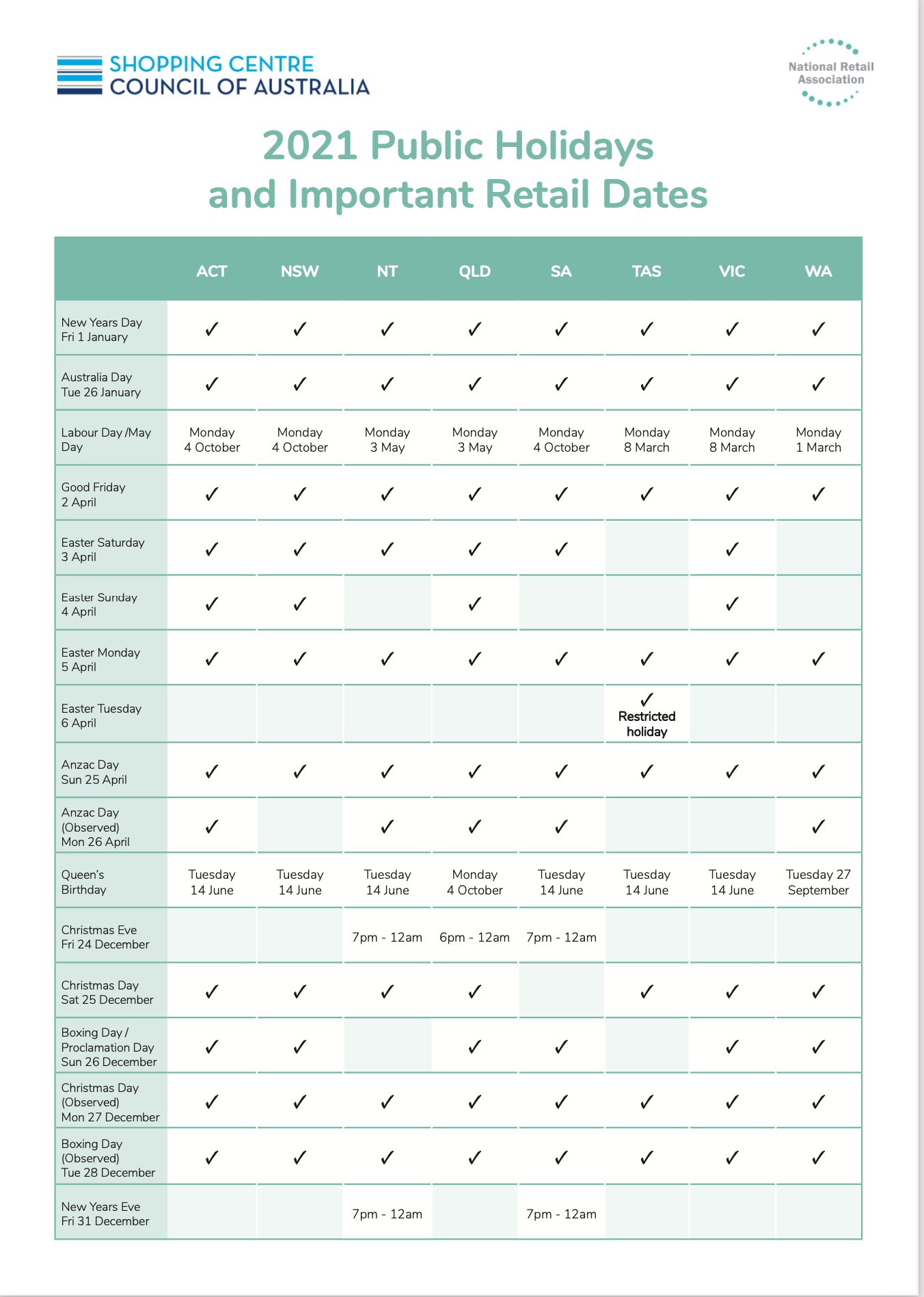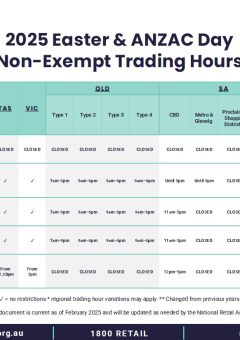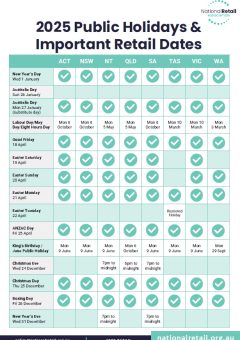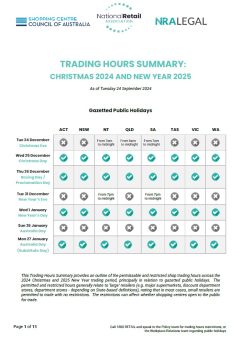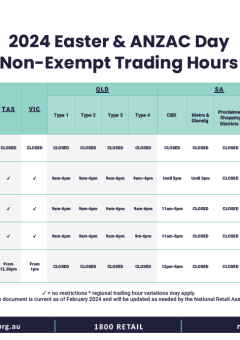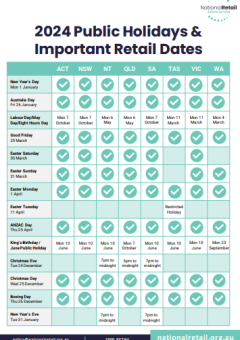Trading hours restrictions in Queensland vary depending on the type of shop and the location of the shop.
Follow these steps to work out what kind of shop you have, and when you can trade:
- Check the list of exempt shops to see if your shop is included in that list.
- If you are not included in the list of exempt shops, check the criteria for independent retail shops.
- If your shop doesn’t fit into either of those categories you are a non-exempt shop.
If you need further assistance in understanding the classification of your business, and the impact this classification has on trading hours, please contact the NRA for clarification.
Trading hour legislation
QLD Trading (Allowable Hours) Act 1990 >
Trading (Allowable Hours) Regulation 2014 No.193 >
Tips on understanding QLD trading hour legislation >
Public holidays
See all QLD Public Holidays >
CHANGES TO 2020 QLD SHOW DAYS
QLD classifications
Exempt stores
(ie shops exempted from trading hours regulation)
Exempt shops are listed in section 5 of the Act. An exempt shop is a shop described in the section that is used predominantly for selling goods by retail or for supplying services that a reasonable person would expect to be sold or supplied in that shop.
The list includes:
(a) antique shop; or
(b) art gallery; or
(c) aquarium and aquarium accessories shop; or
(d) arts and crafts shop; or
(e) bait and tackle shop; or
(f ) bookseller’s shop, newsagent’s shop, railway bookstall; or
(g) bread shop, cake shop, pastry shop; or
(h) camping equipment shop; or
(i) chemist shop; or
(j) confectionary shop; or
(k) cooked provisions shop where the provisions are cooked
or heated on the premises immediately before sale; or
(l) delicatessen; or
(m) fish shop; or
(n) flower shop; or
(o) fruit shop, vegetable shop, fruit and vegetable shop; or
(p) funeral director’s premises; or
(q) hairdresser’s, beautician’s or barber shop; or
(r) ice-cream parlour; or
(s) licensed premises under the Liquor Act 1992 or the Wine Industry Act 1994; or
(t) marine shop; or
(u) milk bar; or
(v) nursery (plant) shop for selling garden plants and shrubs, seeds, garden and landscaping supplies or equipment and associated products; or
(w) pet shop; or
(x) photographic shop; or
(y) premises in relation to which a pawnbrokers licence under the Pawnbrokers Act 1984 is in force; or
(z) restaurant, cafe, refreshment shop; or
(za) service station; or
(zb) shop of a class declared by regulation to be a class of exempt shop; or
(zc) shop for selling motor vehicle spare parts or motorcycle spare parts or both; or
(zd) soap shop; or (ze) souvenir shop; or
(zf ) sporting goods shop; or
(zg) temperance beverages shop; or
(zh) tobacconist’s shop; or (zi) toy shop; or
(zj) veterinary supplies shop; or
(zk) video cassette shop (blank or prerecorded).
TRADING HOURS: Unrestricted
(i.e. they are “exempt” from trading hours restrictions on any day of the year as none are prescribed in the Act).
Independent retail shops
(ie small shops with partial or total exemptions from trading hours regulation)
Independent retail shops are defined at Section 6 of the Act. They may sell any type of good. There are a number of criteria for a shop to be classified as an independent retail shop but the most commonly relied on criteria is that such shops are run by a single operator or a proprietary company and where no more than 20 persons are engaged in the shop at any one time or, where a number of shops are operated, a maximum of 60 persons throughout the State are engaged. Additionally, the business for which the shop if maintained must be wholly owned by a person, or by persons in partnership, or by a proprietary company, that is not a related body corporate.
TRADING HOURS: Unrestricted, except for closure on 25 December (Christmas Day) and Good Friday and until 1:00pm on 25 April (ANZAC Day). Independent retail shops that are predominantly food and/or grocery shops are totally unrestricted.
Non-exempt stores
(ie large retail shops subject to trading hours restrictions)
Non-exempt shops are not defined but the category includes large retailers operating supermarkets and department stores.
The trading hours for non-exempt shops are decided by the QIRC. The QIRC is not permitted to decide trading hours that are less than those in the Trading Hours Act as follows:
- 8am to 9am Monday to Friday; and
- 8am to 5pm for Saturday.
No hours are prescribed for public holidays or for Sundays, making them closed days.
The hours prescribed in the Act are the trading hours for non-exempt shops throughout Queensland unless that QIRC has decided in an order to allow longer hours.
For the South-East Queensland area, the Trading Hours Act also prescribes additional allowable trading hours of 9am to 6pm on Sundays and most public holidays (ie Good Friday, Easter Sunday, Anzac Day, Labour Day and Christmas Day are closed days).
Extended trading hours have been established by QIRC order in most of the major population and tourist areas of the state, allowing trading on seven days per week including most public holidays. Commonly the hours allowed in these seven day trade areas are:
- 8am to 9pm for Monday to Friday;
- 8am to 5pm/5:30pm for Saturday; and
- 9am to 6pm/8:30am to 5:30pm for Sundays and most public holidays.
- Good Friday, 25 April, Labour Day and 25 December are closed days.
The QIRC has made other order for specific classes of non-exempt shops. For example:
- Shops selling motor vehicles (in the majority of the state) may trade 8am – 9pm Monday to Friday, 8am to 5pm Saturday but must remain closed on Sundays and public holidays; and
- Shops selling caravans may trade 8am to 9pm Monday to Friday, 8am to 6pm Saturday but must remain closed on Sundays and public holidays.
QIRC orders can also permit special displays or exhibitions to be conducted outside the hours that shops selling those goods would normally be permitted to trade (eg on a Sunday, public holiday or late night).
The QIRC also makes orders permitting extended trading hours in the 4 weeks prior to Christmas each year.
Previous NRA outcomes on Queensland trading hours
QIRC Decisions allowing Sunday/Public Holiday and other extensions of trading hours for Non-Exempt shops in specified areas.
| Year of Decision |
Details of Area |
| 1988 |
|
| 1992 |
|
| 1994 |
|
| 1995 |
- Townsville CBD
- Cairns Tourist Area.
|
| 1999 |
- Douglas Shire Tourist Area.
|
| 2000 |
- Whitsunday Tourist Area
- New Farm Area.
|
| 2001 |
- Inner City of Brisbane
- Brisbane City (Local Government Area)
|
| 2002 |
In 2002, legislation was passed to improve the QIRC Brisbane City decision i.e. Sunday/ public holiday trading in the south-east Queensland area. Establishes new area (from Noosa to Gold Coast and west to Amberley) within which non-exempt shops can open from 9am-6pm on Sundays and most public holidays. |
| 2003 |
- Hervey Bay (Application failed in part for Yeppoon and Capricorn Coast)
|
| 2004 |
- Townsville CBD area expanded (North Ward) and renamed Townsville Tourist Area.
- Cairns Tourist Area expanded (Clifton Beach and Mt Sheridan).
- Failed application to expand South East Queensland area North to Bundaberg and West to include Toowoomba, Warwick and Stanthorpe. Appeal dismissed.
- 24 hour trading on 23 December (from 8am on 23/12 to 9pm on 24/12) for the Westfield Chermside Shopping Complex. Granted for 2003, 2004 & 2005 only. (Similar applications for Indooroopilly, Robina and Pacific Fair refused)
|
| 2005 |
- Cairns Tourist Area expanded (Redlynch).
- Whitsunday Tourist Area expanded (Cannonvale).
|
| 2006 |
- South East Queensland area expanded to include Nambour and Beerwah.
- Trading from 8am 23 Dec to 9pm 24 Dec at Westfield Chermside.
|
| 2007 |
- Townsville and Thuringowa
- Yeppoon
- South East Queensland area expanded to include Beaudesert
- Cairns (Redlynch)
- Supermarkets in Brisbane City Heart
|
| 2008 |
- Failed application at Mackay. Appeal orders rehearing. See 2010 below.
|
| 2009 |
- Moranbah
- Expand Douglas Shire Tourist Area to include Mossman and extended hours for supermarkets in Port Douglas
- South East Queensland area expanded to include Woolworths at Cooloola (Application failed in part for Gympie and Cooroy)
- Rockhampton
|
| 2010 |
- Toowoomba
- Mackay
- Failed application at Mt Isa
- Edmonton (Cairns Tourist area)
- Failed application at Woodford
- Failed application at Mission Beach and Bargara
- Gold Coast – supermarkets on coastal strip 7-10 Mon-Sat & 8-8 Sun/pub hols
|
| 2011 |
- Failed application at Warwick
- Innisfail
- Emerald
- Cairns CBD Supermarkets – open till 9pm Saturdays and Sundays
- Failed application at Kingaroy
- Gladstone
- Tablelands (Mareeba and Atherton)
- South East Queensland area expanded to include Fernvale, Plainland and Gatton
- New Farm – 7am-9pm every day including public holidays
- Failed application for amalgamation of Townsville/Thuringowa
|
| 2012 |
- City Heart of Inner City of Brisbane – opening time 7am weekdays (Application failed in part re: 7pm Saturday closing Inner City of Brisbane)
- Bundaberg (which includes Elliot Heads, Bundaberg and Bargara)
- Failed application to create Sunshine Coast Coastal Tourist area with 9pm closing every day
- Fraser Coast
- Gympie
- Failed application at Ingham
- Application for 7am-7pm trading in SEQ area discontinued by NRA
- Biloela
- Failed application at Ayr
- South East Queensland area expanded to include Woodford
|
| 2013 |
- Dismissed application by NRA to allow trading hours 8am – midnight 23 December and 12am – pm 24 December
|
| 2014 |
- Inner City of Brisbane (7am-9pm Mon-Fri, & 7am-7pm Sat) and include Petrie Terrace and Kelvin Grove.
- Ipswich CBD (7am-9pm Mon-Fri, 7am-7pm Sat, 9am-6pm Sun and certain public holidays)
- Toowong (7am-9pm Mon-Fri, 7am-7pm Sat, 9am-6pm Sun and certain public holidays)
- New Cairns CBD Area (8am-9pm Mon to Sat, 9am-9pm Sunday and 8.30am-5.30pm Pub Hols)
- Marian in Mirani Shire.
- Townsville Tourist Area (Mon-Sat 7am-9pm, Sun 9am-6pm, certain public holidays 8.30am-5.30pm)
- Extended trading on 23 and 24 December each year for non-exempt shops within the Westfield Garden City Shopping Complex
|
| 2015 |
- New Farm area (7am-9pm Mon-Sun) to include Newstead
- Hamilton North Shore area to 6am-10pm Mon-Fri, 7am-10pm Saturday 7-9pm Sunday and public holidays
- Emu Park Tourist Area
- Dalby
- Failed application for Mt Isa
- Extend the Gold Cost Coastal Tourist Area (2010) to include parts of Southport and Burleigh Heads
- Failed application for Goondiwindi
- Trading on Monday, 28 December 2015 in regional areas without 7 day trading
|
| 2016 |
- South East Queensland Area 7am-9pm Monday to Saturday
- Ingham
|

